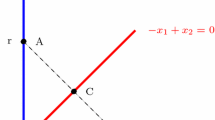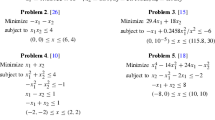Abstract
When does there exist an optimal generating Lagrangian multiplier vector (that generates an optimal solution of an integer programming problem in a Lagrangian relaxation formulation), and in cases of nonexistence, can we produce the existence in some other equivalent representation space? Under what conditions does there exist an optimal primal-dual pair in integer programming? This paper considers both questions. A theoretical characterization of the perturbation function in integer programming yields a new insight on the existence of an optimal generating Lagrangian multiplier vector, the existence of an optimal primal-dual pair, and the duality gap. The proposed pth power Lagrangian method convexifies the perturbation function and guarantees the existence of an optimal generating Lagrangian multiplier vector. A condition for the existence of an optimal primal-dual pair is given for the Lagrangian relaxation method to be successful in identifying an optimal solution of the primal problem via the maximization of the Lagrangian dual. The existence of an optimal primal-dual pair is assured for cases with a single Lagrangian constraint, while adopting the pth power Lagrangian method. This paper then shows that an integer programming problem with multiple constraints can be always converted into an equivalent form with a single surrogate constraint. Therefore, success of a dual search is guaranteed for a general class of finite integer programming problems with a prominent feature of a one-dimensional dual search.
Similar content being viewed by others
References
D.E. Bell and J.F. Shapiro, A convergent duality theory for integer programming, Operations Research 25 (1977) 419–434.
M.L. Fisher, The Lagrangian relaxation method for solving integer programming problems, Management Science 27 (1981) 1–18.
A.M. Geoffrion, Lagrangean relaxation for integer programming, Mathematical Programming Study 2 (1974) 82–114.
M. Guignard and S. Kim, Lagrangian decomposition: A model yielding stronger Lagrangian relaxation bounds, Mathematical Programming 33 (1993) 262–273.
L.S. Lasdon, Optimization Theory for Large Systems (MacMillan, New York, 1970).
D. Li, Zero duality gap for a class of nonconvex optimization problems, Journal of Optimization Theory and Applications 85 (1995) 309–324.
D. Li, Zero duality gap in integer programming: p-norm surrogate constraint method, Oper. Res. Letters 25 (1999) 89–96.
D. Li and X.L. Sun, Success guarantee of dual search in integer programming: pth power Lagrangian method, Journal of Global Optimization (2000) to appear.
X.S. Li, Maximum entropy method in nonlinear programming, Science in China, Series A 34 (1991) 1283–1288.
D.C. Llewellyn and J. Ryan, A primal dual integer programming algorithm, Discrete Applied Mathematics 45 (1993) 262–273.
P. Michelon and N. Maculan, Lagrangian methods for 0–1 quadratic programming, Discrete Applied Mathematics 42 (1993) 257–269.
P. Michelon and N. Maculan, Lagrangian decomposition for integer nonlinear programming with linear constrains, Mathematical Programming 52 (1991) 303–313.
R.G. Parker and R.L. Rardin, Discrete Optimization (Academic, Boston, 1988).
J.F. Shapiro, A survey of Lagrangian techniques for discrete optimization, in: Annals of Discrete Mathematics 5 (1979) pp. 113–138.
L.J. Watters, Reduction of integer polynomial programming problems to zero-one linear programming problems, Operations Research 15 (1967) 1171–1174.
D.J. White, Weighting factor extensions for finite multiple objective vector minimization problems, European Journal of Operational Research 36 (1988) 256–265.
H.P. Williams, Duality in mathematics and linear and integer programming, Journal of Optimization Theory and Applications 90 (1996) 257–278.
Author information
Authors and Affiliations
Rights and permissions
About this article
Cite this article
Li, D., White, D.J. pth Power Lagrangian Method for Integer Programming. Annals of Operations Research 98, 151–170 (2000). https://doi.org/10.1023/A:1019252306512
Issue Date:
DOI: https://doi.org/10.1023/A:1019252306512




